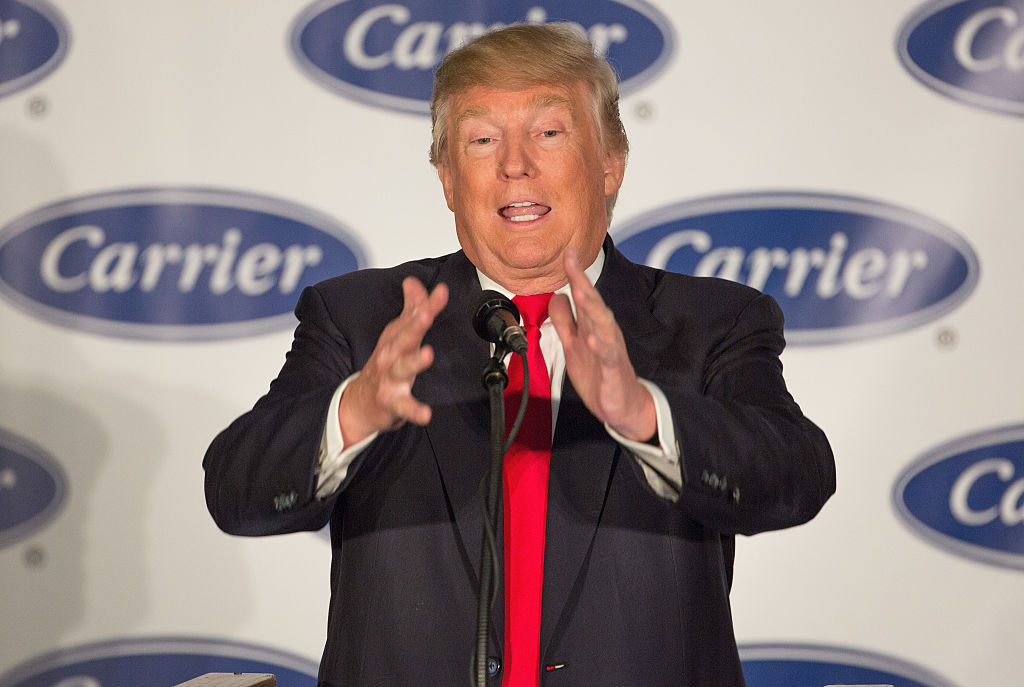Indiana is giving Carrier $7 million to save 800 jobs. Not everyone's impressed with Trump's deal.


A free daily email with the biggest news stories of the day – and the best features from TheWeek.com
You are now subscribed
Your newsletter sign-up was successful
On Thursday, President-elect Donald Trump visited Carrier Corp. in Indiana and claimed victory for a deal that, according to The Wall Street Journal, will result in 800 factory jobs staying in Indianapolis that had been slated to go to Mexico. Carrier still plans to move 600 jobs from that plant to Mexico, plus 700 more from a factory in nearby Huntington owned by Carrier's parent company, United Technologies. In return, Indiana will give United Technologies $7 million in tax breaks and other financial incentives over 10 years, and Carrier will invest some $16 million in Indiana. Carrier said Wednesday the "incentives" were "an important consideration" in its decision.
The deal was hammered out by Indiana Gov. Mike Pence, the vice president-elect, who seemed as surprised as Trump that Carrier agreed to reverse itself on outsourcing the jobs. Not everyone thinks $7 million in tax breaks is a good trade for 800 jobs, especially since 1,300 United Technologies jobs are still leaving for Mexico (Carrier also gets credit in the deal for keeping 300 white collar jobs in Indiana that were not leaving). And the criticism comes from both the right and left.
Trump's "Carrier shakedown is a short-term political victory that will hurt workers and the economy if it becomes the norm for the next four years," says The Wall Street Journal in an editorial. Along with his Ford bullying, "Trump has now muscled his way into at least two corporate decisions about where and how to do business. But who would you rather have making a decision about where to make furnaces or cars? A company whose profitability depends on making good decisions, or a branding executive turned politician who wants to claim political credit?"
The Week
Escape your echo chamber. Get the facts behind the news, plus analysis from multiple perspectives.

Sign up for The Week's Free Newsletters
From our morning news briefing to a weekly Good News Newsletter, get the best of The Week delivered directly to your inbox.
From our morning news briefing to a weekly Good News Newsletter, get the best of The Week delivered directly to your inbox.
Sen. Bernie Sanders (I-Vt.) would pick the president, and in a Washington Post op-ed, he took issue with Trump's tactics, not his meddling. Trump has promised to threaten businesses who outsource jobs with a 35 percent tariff — The Wall Street Journal finds this horrifying — but "instead of a damn tax, the company will be rewarded with a damn tax cut," Sanders wrote. "Wow! How's that for standing up to corporate greed? How's that for punishing corporations that shut down in the United States and move abroad? In essence, United Technologies took Trump hostage and won. And that should send a shock wave of fear through all workers across the country." You can hear more of Sanders' critique in the MSNBC interview below. Peter Weber
A free daily email with the biggest news stories of the day – and the best features from TheWeek.com
Peter has worked as a news and culture writer and editor at The Week since the site's launch in 2008. He covers politics, world affairs, religion and cultural currents. His journalism career began as a copy editor at a financial newswire and has included editorial positions at The New York Times Magazine, Facts on File, and Oregon State University.
-
 How the FCC’s ‘equal time’ rule works
How the FCC’s ‘equal time’ rule worksIn the Spotlight The law is at the heart of the Colbert-CBS conflict
-
 What is the endgame in the DHS shutdown?
What is the endgame in the DHS shutdown?Today’s Big Question Democrats want to rein in ICE’s immigration crackdown
-
 ‘Poor time management isn’t just an inconvenience’
‘Poor time management isn’t just an inconvenience’Instant Opinion Opinion, comment and editorials of the day
-
 TikTok secures deal to remain in US
TikTok secures deal to remain in USSpeed Read ByteDance will form a US version of the popular video-sharing platform
-
 Unemployment rate ticks up amid fall job losses
Unemployment rate ticks up amid fall job lossesSpeed Read Data released by the Commerce Department indicates ‘one of the weakest American labor markets in years’
-
 US mints final penny after 232-year run
US mints final penny after 232-year runSpeed Read Production of the one-cent coin has ended
-
 Warner Bros. explores sale amid Paramount bids
Warner Bros. explores sale amid Paramount bidsSpeed Read The media giant, home to HBO and DC Studios, has received interest from multiple buying parties
-
 Gold tops $4K per ounce, signaling financial unease
Gold tops $4K per ounce, signaling financial uneaseSpeed Read Investors are worried about President Donald Trump’s trade war
-
 Electronic Arts to go private in record $55B deal
Electronic Arts to go private in record $55B dealspeed read The video game giant is behind ‘The Sims’ and ‘Madden NFL’
-
 New York court tosses Trump's $500M fraud fine
New York court tosses Trump's $500M fraud fineSpeed Read A divided appeals court threw out a hefty penalty against President Trump for fraudulently inflating his wealth
-
 Trump said to seek government stake in Intel
Trump said to seek government stake in IntelSpeed Read The president and Intel CEO Lip-Bu Tan reportedly discussed the proposal at a recent meeting
